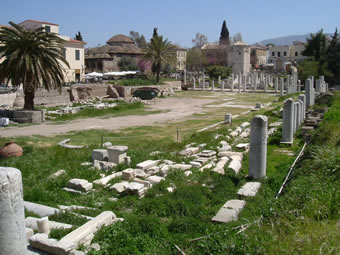Paul at Athens:
"A Few People Believed"
For Sunday May 29, 2011
Lectionary Readings (Revised Common Lectionary, Year A)
Acts 17:22–31
Psalm 66:8–20
1 Peter 3:13–22
John 14:15–21
"Always be prepared to give an answer to everyone who asks you to give the reason for the hope that you have," reads 1 Peter 3:15, "but do this with gentleness and respect." In the book of Acts the physician Luke tells how the apostle Paul did exactly this. The greatest persecutor of the church became its greatest propagator, traveling some 10,000 miles to spread the good news of Jesus. This week finds Paul in Athens — one of the oldest cities in the world, with a history of settlement that was already 5,000 years old in Paul's day.
Not everyone was eager to hear Paul's message, not by a long shot. After a riot erupted in Thessalonica, Paul's companions spirited him away to Berea fifty miles to the southwest. But the agitators hounded him even there, "stirring up the crowds." His partners then took Paul to the coast, where he sailed south two hundred miles down the shore line of the Aegean Sea and landed at Athens. In Athens Paul gave a reason for the hope that was in him to three different audiences.
 |
Athens Agora. |
He started by doing what he always did. Whenever Paul entered a city, writes Luke, "as usual" (14:1) he went to the local synagogue. He did this in Salamis, Pisidian Antioch, Iconium, Berea, Corinth and Ephesus. When he entered Thessalonica, he went to the synagogue, "as was his custom" (17:2). And so when he came ashore in Athens, Paul "reasoned in the synagogue with the Jews and the God-fearing Greeks" (17:17).
For the first few decades after Jesus, the emerging Christian movement was seen as a Jewish sect by the Roman authorities. Jesus was a Jew, of course, as were his first disciples, and as was the rabbinically-trained Paul. In synagogue after synagogue Paul argued that "this Jesus I am proclaiming to you is the Messiah" (17:3). Whereas today some people try to convert Jews into Christians, in those early decades the question was the opposite — could a Gentile join the Jewish Jesus movement? Peter and company were shocked when in Acts 10–11 the Jewish believers conceded that "God has even granted the Gentiles repentance unto life" (11:18). Imagine!
Paul then moved from the Jewish synagogue to the Greek marketplace. "Day by day," writes Luke, he gave a reason for his hope to "those who happened to be there" (17:17). Five hundred years before Paul, the Athenian agora was the center of civic life. In addition to residences, it contained religious temples, law courts, government magistrates, the city council, and economic commerce. In Paul's day it would have included small shop-keepers. Since 1931, the Athenian agora has been excavated by the American School of Classical Studies at Athens.
In the agora Paul engaged a group of Epicurean and Stoic philosophers who ridiculed him as a spermologos or seed-picker. Translators struggle to make sense of this slang word: "A word originally used of birds picking up grain, then of scrap collectors searching for junk, then extended to those who snapped up ideas of others and peddled them as their own without understanding them, and finally to any ne'er-do-well" (EBC). The slur seems to have derided Paul as a bum, a plagiarist, or a poser. Whatever the meaning, Paul's audience was unimpressed when he "preached about Jesus and resurrection"; in their view, he advocated inferior, "foreign gods" (17:18).
 |
Mars Hill or the Areopagus. |
After the agora, Paul went to "a meeting of the Areopagus." The Areopagus was both a place and a group. It's a small rocky hill northwest of the Acropolis in Athens. More importantly, the Areopagus was the most prestigious council of elders in the history of Athens, so-named because it met on that site. Dating back to the 5th-6th centuries BCE, the Areopagus consisted of nine archons or chief magistrates who guided the city-state away from rule by a king to rule by an oligarchy, which in turn laid the foundations for Greece's eventual democracy. Across the centuries the Areopagus changed, so that by Paul's day it was a place where matters of the criminal courts, law, philosophy and politics were adjudicated.
The intelligentsia invited Paul to present his "new teaching" and "strange ideas" (17:20). Paul met them on their own ground, quoting two poets: the Cretan Epimenides (600 BCE), that "in him we live and move and have our being," and then the opening lines of the Phaenomena by Aratus (315-240 BCE), a Greek poet and Stoic of Cilicia, that "we are his children." Paul's message of the resurrection elicited a lukewarm response. Some people "sneered," while others said, "We want to hear you again on this subject" (17:32).
And so Paul left and went to Corinth. Luke ends the story by saying that "a few people believed," including Dionysius, a "member of the Areopagus," a woman named Damaris, who is otherwise unmentioned in the New Testament but is believed by some to have been the wife of Dionysius, "and a number of other" women. Luke has already twice observed that many prominent women had joined the Jesus movement (17:9,12).
At our worst, we Christians have isolated and insulated ourselves from our culture's mainstream. We can be inward-looking, self-absorbed, self-important, and cloistered, instead of engaging people at our contemporary synagogue, agora or Areopagus. A pastor friend once described to me a parishioner whose child had gone to Christian schools for so long that he could barely function in the "real" world. Another pastor lamented to me that at his annual denominational meeting the delegates were merely "talking to themselves."
 |
The Parthenon, Athens. |
But at our best, Christians have followed Paul's example of living, learning and sharing the gospel in the marketplace of ideas, in bars and board rooms as well as in basilicas, in university lecture halls as well as in church fellowship halls. In an outward, centrifugal movement modeled after Paul at the Areopagus, believers have engaged real people where they really live, work, and think, in order to gain a hearing for their "strange ideas" about repentance, rebirth, and the resurrection.
Paul's confidence for addressing the Areopagus rested upon two beliefs. First, as he told King Agrippa after he was arrested and accused of insanity ("Your great learning is driving you mad!"), the message and events of the gospel were "not done in a corner" (Acts 26:26). They are matters of historical record and open to public debate, discourse, and inquiry for all honest seekers. For that reason, the Areopagus was the most natural and fitting of venues for Paul.
Second, as Paul preached to the Athenians, he believed that God "made the world and everything in it," and that every single person was "God's off-spring." In his mind, there is no person or sphere of influence outside of God's care and concern. All of so-called "secular" life, and not just "sacred" realms, are spheres of God's loving presence, or at least potentially so — law, literature, medicine, education, the arts, business, government, science, quite literally anything and everything. And so Paul viewed the venerable Areopagus as just another place where the Lord of all creation had gone before him and was already present; indeed, said Paul to the Athenians, "He is not far from each one of us."
For further reflection
* How and why do Christians become so isolated and ingrown?
* What practical lessons can we draw from Paul's experience at the synagogue, the agora, and the Areopagus?
* See the book Finding God at Harvard (1997).
Image credits: (1) Merlin Travel; (2) Lakeside Ministires; and (3) The World in Photos.





